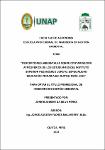| dc.contributor.advisor | Flores Malaverry, Jorge Agustín | |
| dc.contributor.author | Da Silva Perez, Jonehi Josmar | |
| dc.date.accessioned | 2024-03-19T16:33:45Z | |
| dc.date.available | 2024-03-19T16:33:45Z | |
| dc.date.issued | 2023 | |
| dc.identifier.other | 363.7392 D11 2023 | |
| dc.identifier.uri | https://hdl.handle.net/20.500.12737/9931 | |
| dc.description.abstract | The research was carried out to identify the knowledge that students of the Higher Pedagogical Institute of Iquitos (ISPL) have regarding air pollution. The research design is non-experimental, qualitative-quantitative. The sample was 60 students enrolled in 2020, specializing in primary education. The results indicate air pollution as a low intensity problem (4.4%) within the city’s problems. Specifically regarding air pollution, they consider it a non-relevant problem for the city (50%), they do not know about the information on air pollution levels in the city (53.2%), they affirm that it is unreliable (13.3%), and this type of information about the problem under study is rarely known (83.4%). Regarding air pollution in Iquitos, respondents report that it is average (86.7%) to low (13.3%); affecting health from fair (83.3%) to poor (11.7%). Iquitos compared to other cities they say that the level of pollution is regular (46.7%). They think they do not feel when the pollution is high or low, they think that this situation is rarely the case (75%). If the problem existed, it would affect the elderly (51.7%) and children (25%). The main complaints would be headaches (66.7%), eye irritation (58.3%), flu (83.3%), stress (83.3%) among other complaints. Regarding the environmental perception of the city of Iquitos and the atmosphere, people consider it (91.7%) clean, also in their districts Punchana 50%, San Juan 86.7% and Belén (76.7%); Regarding air quality in the future, 92% report that it will worsen, due to the increase in factories (83%), vehicle fleet (42%), use of aerosols (67%), dust (87%), burning of waste (83%) and unpleasant odors (55%). To improve the city’s air quality, they recommend recycling garbage (100%), not burning waste (100%), cooperate with government measures (83%), use less chemicals (83%), summarizing everything, do not contaminate (100%). | en_US |
| dc.description.abstract | La investigación fue realizada para identificar los conocimientos que poseen los estudiantes del Instituto Superior Pedagógico de Iquitos (ISPL), respecto a la contaminación atmosférica. El diseño de investigación es no experimental, cualicuantitativa. La muestra fue de 60 estudiantes matriculados en el año 2020, de la especialidad educación primaria. Los resultados señalan a la contaminación atmosférica como un problema de baja intensidad (4.4%) dentro de la problemática de la ciudad. Específicamente sobre contaminación atmosférica, lo consideran un problema no relevante para la ciudad (50%), no conocen acerca de las informaciones sobre niveles de contaminación atmosférica en la ciudad (53.2%), afirman que las mismas son poco confiables (13.3%), y rara vez se conocen este tipo de informaciones sobre el problema en estudio (83.4%). Sobre la contaminación del aire en Iquitos, los encuestados refieren que está es regular (86.7%) a baja (13.3%); que afecta la salud de regular (83.3%) a baja (11.7%). Iquitos comparado con otras ciudades dicen que el nivel de contaminación es regular (46.7%). Opinan no sentir cuando la contaminación es alta o baja, opinan que es rara vez esta situación (75%). Si existiera el problema está afectaría a los ancianos (51.7%) y niños (25%). Las molestias principales serian, dolor de cabeza o cefaleas (66.7%), irritación de la vista (58.3%), gripes (83.3%), estrés (83.3%) entre otras molestias. Sobre la percepción ambiental de la ciudad de Iquitos y la atmosfera, las personas lo consideran (91.7%) limpio, igualmente en sus distritos Punchana 50%, San Juan 86.7% y Belén (76.7%); a futuro sobre la calidad del aire el 92% refiere que este va empeorar, por el aumento de fábricas (83%), parque automotor (42%), uso de aerosoles (67%), polvo (87%), quema de residuos (83%) y olores desagradables (55%). Para mejorar la calidad del aire de la ciudad, recomiendan reciclaje de basura (100%), no quema de residuos (100%), cooperar con las medidas del gobierno (83%), usar menos químicos (83%), resumiendo todo, no contaminar (100%). | es_PE |
| dc.format | application/pdf | es_PE |
| dc.language.iso | spa | es_PE |
| dc.publisher | Universidad Nacional de la Amazonía Peruana | es_PE |
| dc.rights | info:eu-repo/semantics/openAccess | * |
| dc.rights.uri | https://creativecommons.org/licenses/by/4.0/ | * |
| dc.subject | Contaminación atmosférica | es_PE |
| dc.subject | Percepción | es_PE |
| dc.subject | Estudiante | es_PE |
| dc.subject | Instituto de enseñanza superior | es_PE |
| dc.title | Percepciones ambientales sobre contaminación atmosférica de los estudiantes del Instituto Superior Pedagógico Loreto, especialidad educación primaria en Iquitos. Perú. 2020 | es_PE |
| dc.type | info:eu-repo/semantics/bachelorThesis | es_PE |
| thesis.degree.discipline | Ingeniería en Gestión Ambiental | es_PE |
| thesis.degree.grantor | Universidad Nacional de la Amazonía Peruana. Facultad de Agronomía | es_PE |
| thesis.degree.name | Ingeniero(a) en Gestión Ambiental | es_PE |
| dc.subject.ocde | https://purl.org/pe-repo/ocde/ford#5.07.01 | es_PE |
| renati.author.dni | 46832789 | |
| renati.advisor.orcid | https://orcid.org/0000-0002-1125-8600 | |
| renati.advisor.dni | 05203391 | |
| renati.type | https://purl.org/pe-repo/renati/type#tesis | es_PE |
| renati.discipline | 521236 | es_PE |
| renati.level | https://purl.org/pe-repo/renati/level#tituloProfesional | es_PE |
| renati.juror | Manrique Del Aguila, Julio Abel | |
| renati.juror | Yalta Vega, Ronald | |
| renati.juror | Vizcarra Bentos, Tony | |
| dc.publisher.country | PE | es_PE |





